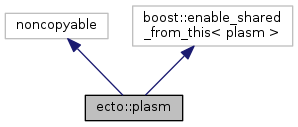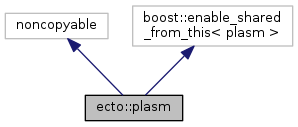The plasm helps construct the graph structure in ecto. It enforces several invariants that are necessary for scheduling DAGs and is used by all the ecto::schedulers to enable execution of modules that are connected in the graph.
More...
#include <plasm.hpp>
|
| | plasm () |
| |
| | ~plasm () |
| |
| void | insert (cell_ptr mod) |
| | Insert the cell into the graph so that it may be executed by a scheduler. More...
|
| |
| void | connect (cell_ptr from, const std::string &output, cell_ptr to, const std::string &input) |
| | Connect one cell to another, and populate the graph accordingly. This will throw on a type mismatch. More...
|
| |
| void | disconnect (cell_ptr from, const std::string &output, cell_ptr to, const std::string &input) |
| |
| void | viz (std::ostream &out) const |
| | output graphviz to a stream. More...
|
| |
| std::string | viz () const |
| | Get a std::string graphiz of the cell. More...
|
| |
| void | check () const |
| | Check that all tags on the graph are satisfied. This will throw on errors in the graph, including, if required inputs are not connected if required outputs are not connected, if there are cycles, etc... More...
|
| |
| graph::graph_t & | graph () |
| | Get the underlying boost graph that this plasm has constructed. More...
|
| |
| const graph::graph_t & | graph () const |
| |
| std::size_t | size () const |
| | Return the number of cells in the plasm (vertices in the graph) More...
|
| |
| std::vector< cell_ptr > | cells () const |
| | Grab a set of all the cells from the plasm. More...
|
| |
| void | configure_all () |
| | Calls configure on all modules, if configure has not already been called. More...
|
| |
| void | activate_all () |
| | Calls activate on all modules, if hasn't already been called. More...
|
| |
| void | deactivate_all () |
| | Calls deactivate on all modules, if it hasn't already been called. More...
|
| |
| void | reset_ticks () |
| |
| void | save (std::ostream &) const |
| |
| void | load (std::istream &) |
| |
The plasm helps construct the graph structure in ecto. It enforces several invariants that are necessary for scheduling DAGs and is used by all the ecto::schedulers to enable execution of modules that are connected in the graph.
| void ecto::plasm::activate_all |
( |
| ) |
|
Calls activate on all modules, if hasn't already been called.
| ecto::plasm::BOOST_SERIALIZATION_SPLIT_MEMBER |
( |
| ) |
|
|
private |
| std::vector<cell_ptr> ecto::plasm::cells |
( |
| ) |
const |
Grab a set of all the cells from the plasm.
- Returns
- a set of cells.
| void ecto::plasm::check |
( |
| ) |
const |
Check that all tags on the graph are satisfied. This will throw on errors in the graph, including, if required inputs are not connected if required outputs are not connected, if there are cycles, etc...
| void ecto::plasm::configure_all |
( |
| ) |
|
Calls configure on all modules, if configure has not already been called.
| void ecto::plasm::connect |
( |
cell_ptr |
from, |
|
|
const std::string & |
output, |
|
|
cell_ptr |
to, |
|
|
const std::string & |
input |
|
) |
| |
Connect one cell to another, and populate the graph accordingly. This will throw on a type mismatch.
- Parameters
-
| from | The from cell |
| output | The output key of the from cell |
| to | The to cell |
| input | The input key from the to cell. |
| void ecto::plasm::deactivate_all |
( |
| ) |
|
Calls deactivate on all modules, if it hasn't already been called.
| void ecto::plasm::disconnect |
( |
cell_ptr |
from, |
|
|
const std::string & |
output, |
|
|
cell_ptr |
to, |
|
|
const std::string & |
input |
|
) |
| |
Disconnect a tendril from another tendril.
- Parameters
-
Get the underlying boost graph that this plasm has constructed.
- Returns
| void ecto::plasm::insert |
( |
cell_ptr |
mod | ) |
|
Insert the cell into the graph so that it may be executed by a scheduler.
- Parameters
-
| mod | The cell to insert into the graph. |
| void ecto::plasm::load |
( |
std::istream & |
| ) |
|
template<class Archive >
| void ecto::plasm::load |
( |
Archive & |
ar, |
|
|
const unsigned |
int |
|
) |
| |
|
private |
| void ecto::plasm::reset_ticks |
( |
| ) |
|
| void ecto::plasm::save |
( |
std::ostream & |
| ) |
const |
template<class Archive >
| void ecto::plasm::save |
( |
Archive & |
ar, |
|
|
const unsigned |
int |
|
) |
| const |
|
private |
| std::size_t ecto::plasm::size |
( |
| ) |
const |
Return the number of cells in the plasm (vertices in the graph)
| void ecto::plasm::viz |
( |
std::ostream & |
out | ) |
const |
output graphviz to a stream.
- Parameters
-
| out | the output stream. Graphviz will be in plain text format. |
| std::string ecto::plasm::viz |
( |
| ) |
const |
Get a std::string graphiz of the cell.
- Returns
| friend class boost::serialization::access |
|
friend |
| bool ecto::plasm::configured |
|
private |
| boost::shared_ptr<impl> ecto::plasm::impl_ |
|
private |
The documentation for this struct was generated from the following file:
- /home/vrabaud/workspace/recognition_kitchen/src/ecto/include/ecto/plasm.hpp


 1.8.11
1.8.11